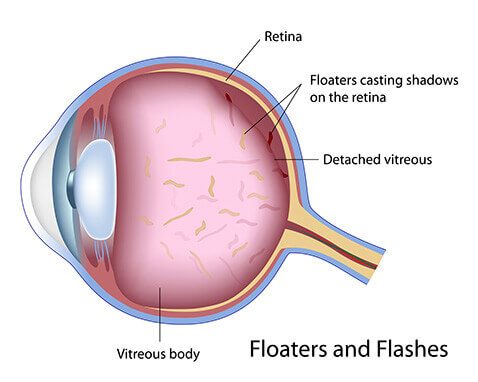Floaters & Flashes

Most of us experience small specks or black dots moving around in our vision at some point in our lives. It is not uncommon to initially believe you have an insect or eye lash only to quickly find you are unable to swat it away. These are referred to as floaters and are usually harmless. However, in some cases, they can lead to bigger problems.
What is a Floater?
Floaters are actually clumps of gel inside the eye. This gel in the posterior chamber is called vitreous. As a child, it is thick and solid in consistency. As we age, portions of vitreous may liquefy or shrink, resulting in clumps or strands of gel inside the eye. These clumps then cast shadows onto the retina, resulting in black spots in the visual field.
Floaters are most often benign. However, they can lead to serious problems. The vitreous gel adheres to the retina, the blood vessels and the optic nerve inside the eye. As it clumps and pulls away from those structures, there is a possibility for the retina to be torn or for bleeding to occur. This is more common in people who are nearsighted, have undergone cataract surgery or YAG laser surgery, or who have had inflammation inside the eye.
Flashes
Flashes of light may occur during this process as well. The mechanism of clumping and pulling away of the gel from the retina can result in flashes of light due to stimulation of the retina. These flashes may also indicate a possible retinal tear. A torn retina is always considered a serious problem because it can lead to a retinal detachment where the retina comes off the back of the eye.
What do I do if I am experiencing floaters and/or flashes of light?
Contact your Eye Group of Connecticut ophthalmologist as soon as possible if you experience new floaters, sudden flashes of light, or a shadow out in the periphery of your vision that appears to be enlarging. These may indicate the presence of a retinal tear or retinal detachment. Floaters that have not resulted in retinal tears or hemorrhage are harmless and usually become less noticeable over time and require no treatment.
